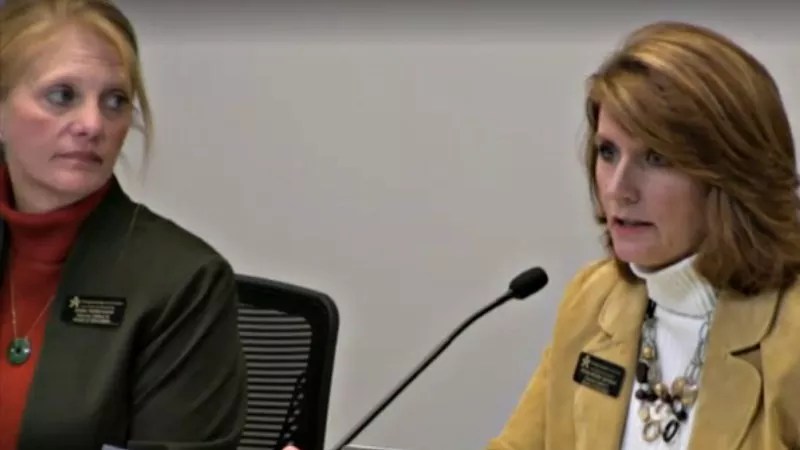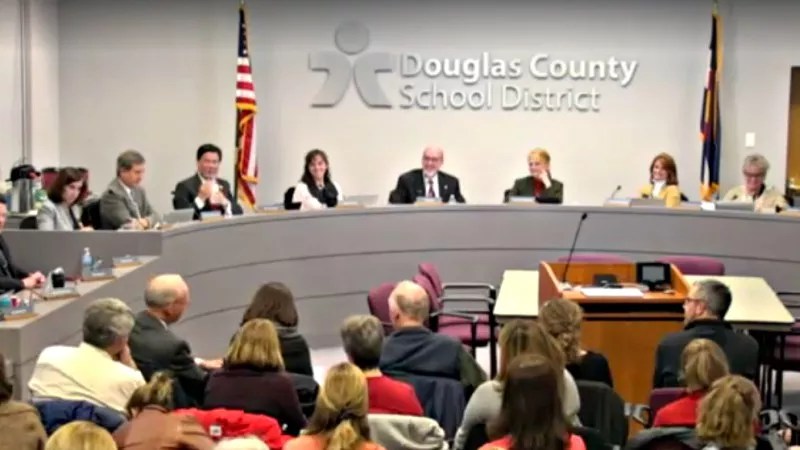

Audio By Carbonatix
At a meeting on Monday, December 4, the Douglas County School Board killed the district’s controversial voucher program, ending years of conflict. The fight has waged for years in the court system, but in the end, victory was achieved at the ballot box thanks to the electoral success of anti-voucher candidates last month.
The no-on-vouchers vote was 6-0, with boardmember Kevin Leung abstaining – and he only did so because he was a plaintiff in a lawsuit against the voucher program. Like fellow boardmembers Chris Ciancio-Schor, Anthony Graziano and Krista Holtzmann (supported last night by board president David Ray, vice president Wendy Vogel and treasurer Anne-Marie Lemieux), Leung made snuffing out the vouchers the central theme of his campaign.
We first started covering this issue six years ago, when James LaRue, who was both the father of a DougCo student and director of the county’s public libraries, led a group of plaintiffs (including Leung) suing the district over the policy, claiming that it diverted public money to religious institutions. Here’s an excerpt from the lawsuit:
The Program, enacted by the Douglas County Board of Education on March 15, 2011, takes public funds provided by the State of Colorado – which are required by law to be spent on public schools – and uses them to pay for tuition at private schools. The vast majority of these private schools are religious, are controlled by churches or other religious institutions, and discriminate in both employment and admissions on the basis of religion. Many of them require students to receive religious instruction and attend religious worship services…
In diverting millions of dollars in public funds intended solely for public education to instead finance overtly religious and private education, the Douglas County School District also cedes control over this education to the private-school aid recipients, resulting in a taxpayer-funded education that deviates substantially from the legal standards and requirements governing the public education provided by the District itself. The private schools participating in the Program are not controlled or directed by any local board of education or elected directors, and the education they provide differs in material respects from the District’s – including, among others, teacher certification, background, educational goals, curriculum, and approved textbooks.
The suit was filed in June 2011, and that August, a Denver District Court judge granted a request for a preliminary injunction, thereby putting the voucher program on hold. At the time, Mark Silverstein, legal director for the ACLU of Colorado, one of the complaint’s primary backers, argued that an appeal of this ruling would be a waste of taxpayer dollars, but the plaintiffs didn’t agree – and in 2013, the Colorado Court of Appeals found in favor of Douglas County by a 2-1 margin.

The Douglas County School Board at the December 4 meeting.
In March 2014, the voucher program appeal headed to the Colorado Supreme Court, which ruled in favor of LaRue and the ACLU. But opponents – including the Alliance Defending Freedom, the same group that’s backing the conservative Christian owner of Masterpiece Cakeshop in a case being heard at the U.S. Supreme Court today – didn’t meekly accept defeat. In the DougCo case, however, the U.S. Supreme Court didn’t accept the school district’s appeal. This past June, as reported by Colorado Politics, the matter was sent back to the Colorado Supreme Court, where it awaited a judgment whose necessity has now been nullified by the new board’s action.
Among those celebrating the program’s burial was American Federation of Teachers president Randi Weingarten. In a statement, she noted that the “unanimous decision of the Douglas County school board to end its voucher program is a resounding victory for every child, parent and teacher in America who believes in the promise of public education. The voters of Douglas County, by overwhelmingly electing public school champions to the board last month, sent a clear message that privatization doesn’t work and unfair handouts for private schools must end. Elections have consequences…. The board sided with public schools and public school students and their families over those who would seek to destabilize, disrupt and defund them to serve their own ends. The privatizers’ argument before the Colorado Supreme Court is now moot.”
The ACLU’s Silverstein also weighed in. His statement reads in part: “”We applaud the Douglas County School Board for responding to the clear message that voters sent in the recent election and conclusively ending the unconstitutional and divisive private school voucher program. The School District will no longer pursue a path that would weaken public schools by funneling taxpayer dollars to private, religious schools, in violation of our state constitution.”
Silverstein added: “As the Colorado Supreme Court ruled in 2015, parents are free to send their children to private, religious schools if they wish, but our constitution guarantees that taxpayers are not forced to pay for it.”